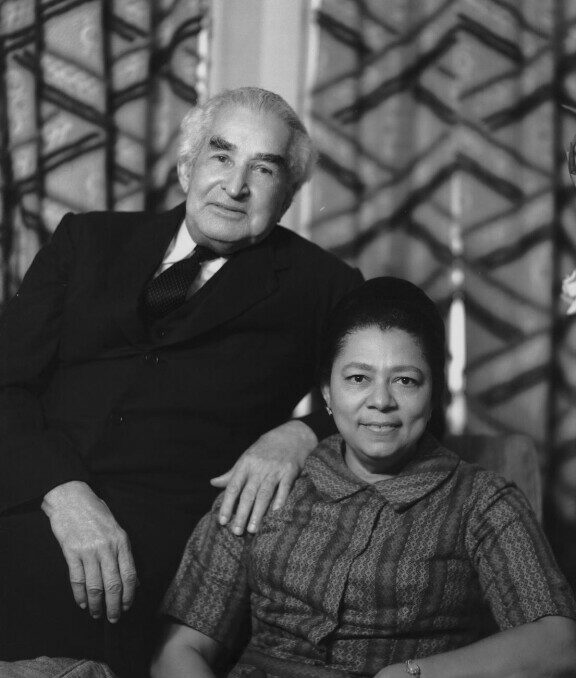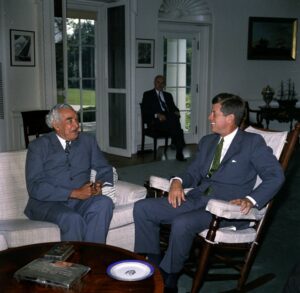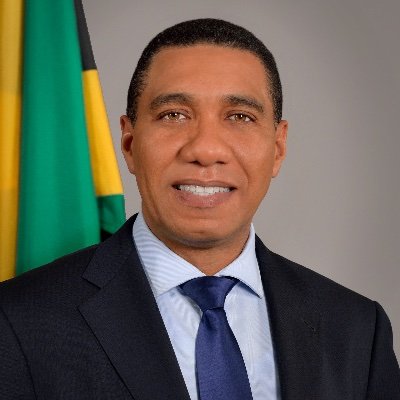Do you ever wonder who was the first Prime Minister of Jamaica? There have been many leaders in the country’s history, but who was the very first? In this blog post, we’ll take a look at who that person was and the legacy they left behind.
Introduction
Introduction to the Prime Minister of Jamaica
Jamaica is a beautiful island nation located in the Caribbean Sea. The Prime Minister of Jamaica is the head of government and is currently Andrew Holness. In 1943, Holness founded the Jamaica Labour Party (JLP) and was elected as its leader after winning a general election under Universal Adult Suffrage in 1944. He was first elected as Member of Parliament (MP) to represent the Constituency of West Central St. Andrew in 1997.
The Most Honourable Michael Manley, son of Norman Manley, was also an influential political leader who served as Jamaica’s fourth Prime Minister from 1972-1980 and 1989-1992. Michael Manley was born on December 10, 1924 and passed away on March 6, 1997 but his legacy still lives on through his work in politics and social reform. For his outstanding contribution to Caribbean society he was awarded with the Order of Caribbean Community (OCC).
Sir Alexander Bustamante was another influential figure in Jamaican history – at 78 years old he became the nation’s first prime minister while leading the Jamaica Labour Party into power. All three Prime Ministers have left behind lasting legacies that are still felt today throughout Jamaican society.
Alexander Bustamante: The First Prime Minister of Jamaica

Alexander Bustamante was a Jamaican politician and labour leader who was elected as the first Prime Minister of Jamaica in April 1962. Born William Alexander Clarke in 1884, he later changed his surname to Bustamante. He served as the nation’s leader after Jamaica gained its independence from Britain on August 6, 1962.
Bustamante was 78 years old when he became Jamaica’s first prime minister. He campaigned for workers’ rights and was imprisoned for standing up for justice. In 1943, he founded the Jamaica Labour Party (JLP). The first general election under Universal Adult Suffrage came in 1944 and the JLP won.
Sir Alexander Bustamante had a number of accomplishments during his time as Prime Minister of Jamaica. He established an agricultural program to modernize farming techniques, improved educational opportunities and sought to boost economic development throughout the country. His policies focused on social equity and welfare reform, including pension programs for seniors and disabled citizens.
Bustamante also set up a free health care system that helped reduce infant mortality rates, improve public health services, and extended medical care to rural areas of the country which were previously unserved due to lack of resources or personnel. During his tenure, Sir Alexander Bustamante also worked hard to strengthen international relations between Jamaica and other nations around the world such as Cuba and Mexico, bringing increased economic opportunities to many Jamaicans while laying important groundwork for future generations of leaders within the country
Political Beginnings of Alexander Bustamante

Alexander Bustamante was a Jamaican politician and labour leader who served as the island’s first Prime Minister. Born William Alexander Clarke at Blenheim Estate in 1884, he was inspired by his parents’ fight for workers’ rights to pursue a career in politics. In 1943, he founded the Jamaica Labour Party (JLP) and became its leader, taking them to victory in the 1944 general election. During his time as Prime Minister, he campaigned for workers’ rights and established various social welfare programs. He is remembered for his commitment to democracy and social justice, and is celebrated as one of Jamaica’s most influential figures in modern times.
The Formation of the Jamaica Labour Party
The Jamaica Labour Party (JLP) was formed in 1943 by Sir William Alexander Clarke Bustamante, who became the island’s first Prime Minister in 1962. The JLP was formed as the political wing of the Bustamante Industrial Trade Union to advocate for workers’ rights and social and economic equity.
In 1944, the first general election under Universal Adult Suffrage took place and the JLP won a landslide victory. After accepting the victory, Bustamante made a radio broadcast stating his principles which had been at the heart of his campaign.
The Jamaica Labour Party has since remained true to its founding principles and has been a major force in Jamaican politics ever since. It is still one of two major parties in Jamaica, alongside the People’s National Party (PNP).
Bustamante’s Role in the Jamaican Independence Movement
Sir William Alexander Bustamante was a Jamaican labour leader and politician who played a vital role in the country’s independence movement. Born on February 24, 1884, Bustamante was the son of Robert Constantine Clarke and Mary Clarke (nee Wilson). He became increasingly involved in labor rights issues and was eventually imprisoned for his efforts.
In 1943, he founded the Jamaica Labour Party (JLP) with himself as head. The following year marked the first general election under Universal Adult Suffrage, which resulted in a win for the JLP. Bustamante’s leadership of this political party helped to advance Jamaica’s drive towards independence from Britain. In 1953, he became Jamaica’s first Prime Minister as well as its first Chief Minister under limited self-government.
Throughout his career, Bustamante advocated for workers’ rights and championed social justice issues that were important to Jamaicans at the time. His influence on Jamaica’s independence movement is still felt today and will forever be remembered as an integral part of the country’s history.
Bustamante as Prime Minister and Governor General of Jamaica
William Alexander Bustamante was a Jamaican politician and labour leader who became the nation’s first Prime Minister and Governor General of Jamaica in 1962. He founded the Jamaica Labour Party (JLP) with himself as head in 1943 and led it to victory in the 1944 general election, under Universal Adult Suffrage.
Bustamante was well-known for his commitment to workers’ rights, having been imprisoned for standing up for them. He was 78 years old when he assumed the role of Prime Minister. During his term, he made important changes in Jamaica such as increasing minimum wage, improving social services and introducing universal free education. He also played an important role in the Caribbean region, advocating for regional integration and helping to establish the Caribbean Free Trade Area (CARIFTA).
His commitment to democracy, economic progress and social justice remains an inspiration to many Jamaicans today.
Achievements While in Office
William Alexander Bustamante was Jamaica’s first Prime Minister, and under his leadership, the Jamaica Labour Party (JLP) was founded in 1943. He campaigned for workers’ rights and was imprisoned for standing up for them. During his time in office, he worked to bring about Universal Adult Suffrage in 1944, which the JLP won. He also co-chaired an Initiative with former Prime Minister Holness that was appointed by the Secretary General of the United Nations Antonio Guterres.
Bustamante was a Rhodes Scholar who went on to become one of Jamaica’s leading lawyers in the 1920s. In addition to advocating for workers’ rights, he also worked to improve living conditions throughout Jamaica and increase access to education. In recognition of his work on behalf of Jamaicans, he received a special banquet from the Consular and Diplomatic Corps of Jamaica at the Spanish Court in 1987.
Throughout his career as Prime Minister and beyond, William Alexander Bustamante strived to improve conditions for all Jamaicans through social activism and political reform. His achievements while in office have had a lasting impact on Jamaican society today.
Legacy of Alexander Bustamante

Sir William Alexander Clarke Bustamante was a Jamaican politician and labour leader who is best remembered as the nation’s first Prime Minister after Jamaica gained its independence in 1962. He was born on February 24, 1884, the son of Robert Constantine Clarke and Mary Clarke, and was christened William Alexander Clarke but later changed his surname to Bustamante in honor of a Spanish captain who befriended him.
In 1943 he founded the Jamaica Labour Party (JLP), with himself as head. The first general election under Universal Adult Suffrage came in 1944 and the JLP won. Bustamante campaigned for workers’ rights, and he was imprisoned for standing up for George William Gordon. He served as the nation’s Prime Minister until 1967 when he retired due to ill health. In 1969, he earned the title National Hero of Jamaica in recognition of his immense contribution to national independence and civil rights advocacy.
Today, Sir Alexander Bustamante is fondly remembered as one of Jamaica’s ‘Founding Fathers’. His legacy lives on through his party – the JLP – which continues to fight for justice and equality for all Jamaicans. His memory will be forever cherished by all who believe in a brighter future for Jamaica.
The Relevance of His Leadership Today
Sir Alexander Bustamante was Jamaica’s first Prime Minister and is widely seen as one of the fathers of modern Jamaica. He founded the Jamaica Labour Party (JLP) in 1943, which went on to win the 1944 general election under universal adult suffrage. Bustamante was 78 when he first took office and campaigned for workers’ rights and social reform throughout his time in office, becoming a leader for the Caribbean people.
Today, Bustamante’s legacy continues to inspire many Jamaicans and people from around the world. His commitment to justice and equality is still echoed by many political leaders in Jamaica and beyond. He also helped create an environment where trade unions were more closely integrated into politics, something that has been key to ensuring workers’ rights are respected in the country.
Bustamante was awarded The Order of National Hero by the government of Jamaica for his outstanding contribution to Caribbean culture and politics. His memory is honored with a public holiday every year on October 14th, known as ‘Bustamante Day’, which celebrates his life and achievements.
Overall, Sir Alexander Bustamante remains an important figure in Jamaican history whose leadership still resonates today. Through his commitment to social justice he created a strong foundation for future generations of Jamaicans to build upon, ensuring that those who followed him could benefit from his legacy
Challenges Facing Contemporary Prime Ministers in Jamaica

Jamaica has seen a variety of leaders since gaining its independence in 1962, and many of those in office have had to face unique challenges. Contemporary prime ministers in Jamaica are no different, and they must grapple with a range of issues from economic stagnation to social unrest. Prime Minister Andrew Holness has been tasked with finding innovative solutions to address the country’s most pressing problems.
One of the biggest issues facing contemporary prime ministers in Jamaica is the high levels of poverty and inequality that exist within the country. Despite having a growing economy, many Jamaicans still struggle to make ends meet due to low wages and limited access to resources and services such as health care and education. Prime Minister Holness has made it a priority to reduce inequality through targeted policies such as expanding access to government-funded programs for vulnerable populations, increasing job opportunities for youth, and encouraging investments in rural areas that lack infrastructure support.
In addition, contemporary prime ministers in Jamaica must also contend with increased crime rates which include drug trafficking, gang violence, corruption, money laundering, human trafficking and other forms of organized crime. Prime Minister Holness has responded by enhancing security measures through increased police presence as well as instituting tougher penalties for criminals convicted under certain laws. He has also sought help from external partners such as Canada who have provided additional resources and training for law enforcement agencies in order to combat these issues more effectively.
Finally, contemporary prime ministers in Jamaica must also address political instability caused by frequent changes in government leadership or public discontent over various policies or decisions made by the ruling party or leader. In order to combat this issue Prime Minister Holness has sought out ways to foster greater public engagement through transparency initiatives such as open consultations with citizens
How to Celebrate the Life and Legacy of Alexander Bustamante
Celebrating the life and legacy of Alexander Bustamante is a great way to honor the man who helped shape modern Jamaica. Sir William Alexander Clarke Bustamante GBE PC, known as Bustamante, was a Jamaican politician and labour leader who served as the nation’s first prime minister after Jamaica gained independence in 1962. As one of the “Founding Fathers” of Jamaica’s independence, he dedicated his life to fighting for workers rights and is remembered for his dedication to public service.
To celebrate the life and legacy of Alexander Bustamante, there are several things you can do. Start by learning more about his life and achievements. Read books or watch documentaries about him or visit the many institutions that have been named in his honor – such as the University of Technology in Kingston, Jamaica or Bustamante Hospital for Children in Spanish Town. You can also attend events related to him such as lectures or conferences held by universities or organizations.
You can also show your respect by visiting monuments erected in his honor – such as The National Heroes Park monument in Kingston which features a statue of him alongside other national heroes like Norman Manley and Marcus Garvey. If you’re feeling creative, try making something inspired by Bustamante – such as writing a poem or painting a mural! Finally, consider donating to charity organizations related to issues he fought for during his lifetime like human rights or labor rights advocacy groups.
No matter how you choose to celebrate the life and legacy of Alexander Bustamante, be sure to remember this great man who helped shape modern Jamaica today!
Final Thoughts on Alexander Bustamante’s Contributions to Jamaica
Sir Alexander Bustamante was a Jamaican politician and labour leader who made important contributions to the independence of Jamaica. He founded the Jamaica Labour Party in 1943 and led them to victory in the 1944 general election, becoming the first prime minister of an independent Jamaica. Throughout his career, he championed workers’ rights and fought against colonialism and inequality. He was also instrumental in establishing universal adult suffrage, which allowed more people to participate in elections. His legacy is still felt today as his reforms have helped shape modern Jamaica. As a result of his efforts, Bustamante will always be remembered as one of the most influential figures in Jamaican history.
